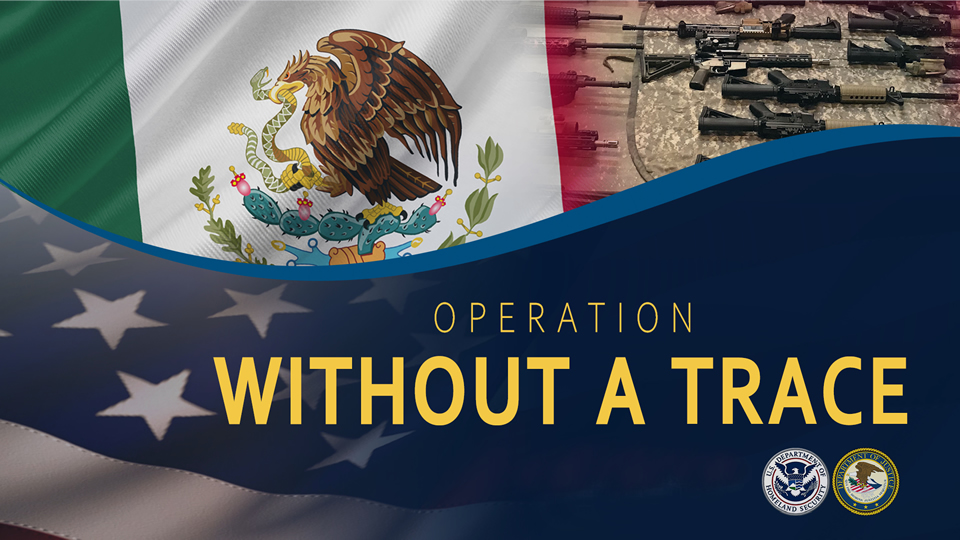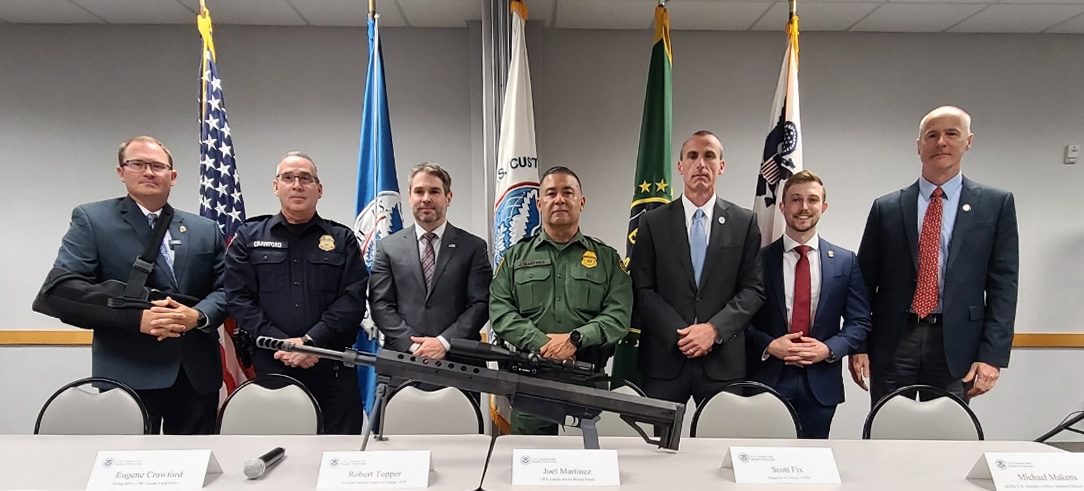Archived Content
In an effort to keep ICE.gov current, the archive contains content from a previous administration or is otherwise outdated. This information is archived and not reflective of current practice.
HSI, DHS announce results of Operation Without a Trace, coordinated enforcement effort interdicting southbound firearms
LAREDO, Texas — On Aug. 31, the Department of Homeland Security (DHS) and its federal partners announced the results of increased enforcement efforts to stem the trafficking of firearms from the United States into Mexico for use by transnational criminal organizations. As of July 2023, DHS’ and the Bureau of Alcohol, Tobacco, Firearms, and Explosives’ (ATF) southbound firearm seizures in fiscal year 2023 have already significantly outpaced the seizures from fiscal year 2022. These seizures are the result of DHS’ Operation Without a Trace and the ATF’s Operation Southbound, which specifically target the southbound and outbound movement of firearms along the United States’ southwest border.
In Laredo, DHS has seized over twice as many firearms in fiscal year 2023 than it did in fiscal year 2022. Speaking at an Aug. 31 roundtable in Laredo, Homeland Security Investigations (HSI) San Antonio Special Agent in Charge Craig Larrabee, U.S. Customs and Border Protection (CBP) Acting Director of Field Operations for Laredo Eugene Crawford, ATF Assistant Special Agent in Charge of the Houston Field Division Robert Topper, Houston U.S. Postal Inspection Service Chief Scott Fix, and Assistant U.S. Attorney Michael Makens stressed that interdicting southbound firearms prevents criminal cartels from using them in illicit activity, such as the production and trafficking of fentanyl.
"Investigations to break down criminal networks have benefitted tremendously from increased interagency collaboration, both within DHS and with our federal partners," said Larrabee. "Keeping weapons and ammunition out of the hands of criminals is vital to keeping communities safe on both sides of the border. Our investigations bring criminals to justice here in the United States and provide law enforcement partners in Mexico support as they work to dismantle dangerous cartel networks."
"Denying transnational criminal organizations firearms and currency is vital to degrading, disrupting, and dismantling their criminal networks," said Crawford. "Increased deployment of technology and the intelligence gathered by CBP interdiction operations is helping inform investigations so that we can get more of the criminal actors in these networks off our streets."
“Mexican transnational criminal organizations obtain firearms and ammunition primarily in the United States and are primary participants in cross-border firearms trafficking. This has resulted in the proliferation of U.S.-based illegal firearms trafficking schemes perpetrated by illicit firearms dealers, individuals and other criminal groups that capitalize on the ever-present demand,” said Topper. “ATF is committed to working with our law enforcement partners to combat these illegal trafficking routes, trends, patterns and sources.”
“The U.S. Postal Inspection Service is committed to ensuring the U.S. mail is not used to illegally traffic firearms or certain components of firearms throughout the United States and beyond,” said Fix. “Postal Inspectors work closely with our local, state and federal law enforcement partners to ensure that any criminal group attempting to use the U.S. mail to further their illegal trafficking of firearms and parts is brought to justice.”
The roundtable followed the Southbound Firearms Trafficking Coordination Meeting held on June 14, 2023, at the White House, where Deputy Attorney General Lisa Monaco, former Deputy Homeland Security Secretary John K. Tien, U.S. Ambassador to Mexico Ken Salazar, ATF Director Steve Dettelbach, and Deputy Homeland Security Advisor Josh Geltzer discussed efforts to increase collaboration across the federal enterprise. It was the first of a series of events to be held along the southwest border in the coming weeks to highlight the increased collaboration DHS is leading with federal partners, state and local law enforcement, and the Mexican government to combat transnational criminal networks.
As the primary federal law enforcement agency responsible for investigating international smuggling operations and enforcing U.S. export laws, HSI stops contraband from being smuggled across the southwest border into Mexico. To learn more about HSI investigations, see ICE.gov. CBP plays a pivotal role in combating firearms trafficking by screening southbound vehicle traffic and rail shipments for illegal weapons, drugs and cash. To learn more about CBP seizures of firearms, see CBP.gov.
HSI is the principal investigative arm of DHS, responsible for investigating transnational crime and threats, specifically those criminal organizations that exploit the global infrastructure through which international trade, travel, and finance move. HSI’s workforce of more than 8,700 employees consists of more than 6,000 special agents assigned to 237 cities throughout the United States, and 93 overseas locations in 56 countries. HSI’s international presence represents DHS’s largest investigative law enforcement presence abroad and one of the largest international footprints in U.S. law enforcement.



